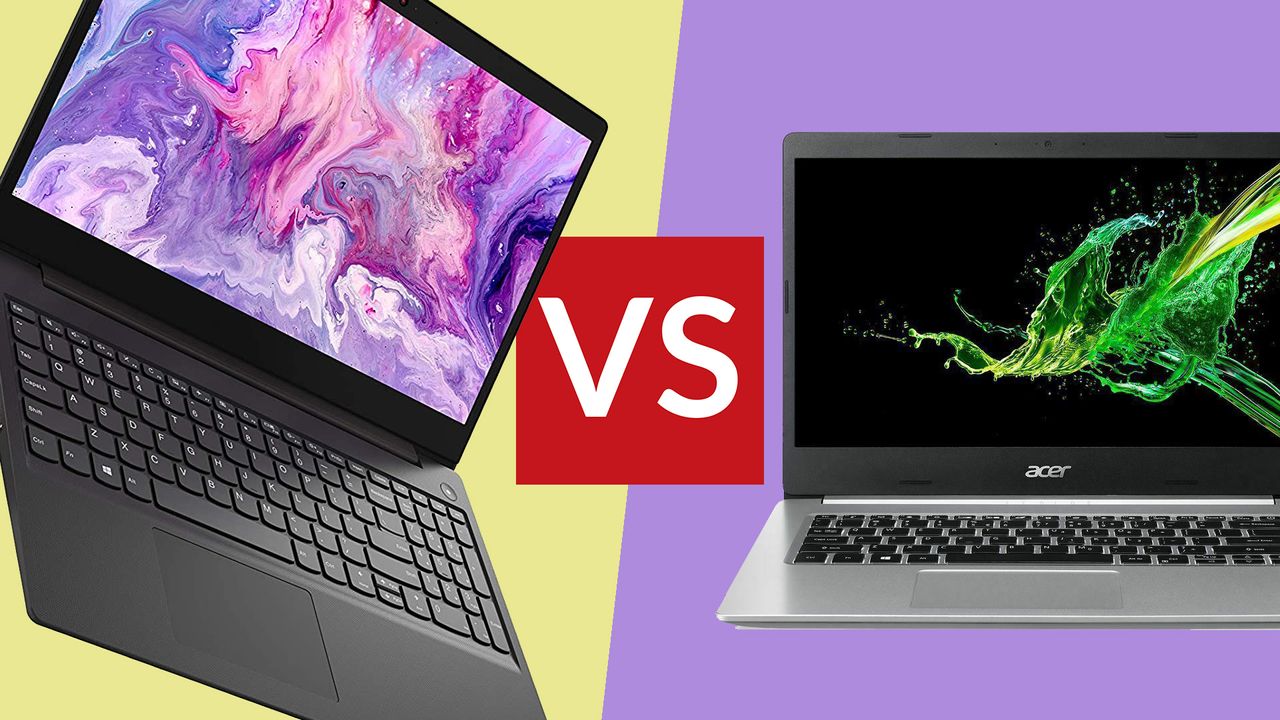
Acer and Lenovo are two of the biggest brands in laptops. Indeed you'll find their products in T3's best laptops, best lightweight laptops and best 2-in-1 laptops buying guides.
But just because Acer and Lenovo's systems sit in such prestigious company doesn't mean everything they make is expensive. The Acer Aspire 5 and Lenovo IdeaPad 3, for example, are both surprisingly affordable portable PCs, making them among best laptops under £500.
That price point secures a surprising amount of mobile computing. Both the Acer Aspire 5 and Lenovo IdeaPad 3 deliver FullHD 1080p screens, quad-core CPUs, a fast 256GB M.2 SSD and 8GB of system memory. In short, there are no major weak points. These are full-feature laptops capable of proper computing, not just web browsing and streaming video. Both systems also offer decent if not quite all-day battery life.
However, it pays to dig down into the details. For starters, the Acer Aspire 5 runs an Intel Core i5 processor to the Lenovo’s AMD Ryzen 5. But the finer details including connectivity, proportions and styling also separate these closely matched portables. You might also want to check out our full Acer Aspire 5 review, which covers the A514-52-582Y model.
Acer Aspire 5 versus Lenovo IdeaPad 3: Design and screen
In an age of super slim bezels and maximum screen-to-body ratios, neither the Acer Aspire 5 nor Lenovo IdeaPad 3 cut a hugely contemporary dash. The Acer in particular looks like a laptop rescued from a decade or so ago with its fat chin bezel and contrast silver chassis and black bezels.
The Lenovo IdeaPad 3 isn’t exactly on the cutting edge of slim bezel design, either. But it’s the slicker, more expensive looking laptop. That said, thanks to Acer’s smaller FullHD 1080p 14-inch display, it’s actually the more compact and lighter laptop, weighing in at 1.7kg to the Lenovo’s 1.85kg, which could be worthwhile if portability is a primary concern.
- Got a bigger budget? These are the best laptops money can buy
- For more bargain options, check out the best Chromebooks
The Acer Aspire 5 also scores with its high quality IPS LCD, with wide viewing angles and 250nits of brightness. The Lenovo IdeaPad 3 counters with a 15.6-inch panel, again FullHD 1080p with 1,920 by 1,080 pixels. However, it’s a lower quality TN-type screen. That means narrower viewing angles, lower contrast and less accurate colours. It’s also dimmer, with a 200 nit rating.
Sign up to the T3 newsletter for smarter living straight to your inbox
Get all the latest news, reviews, deals and buying guides on gorgeous tech, home and active products from the T3 experts
As for connectivity, both Acer and Lenovo deliver three USB-A ports, two running at 5Gbps 3.1 Gen 1 spec, one a plain old 2.0 socket. However, the Acer Aspire 5 also has a single USB-C port, again offering 5Gbps of peak throughput. The lack of a USB-C port on the Lenovo IdeaPad 3 is definitely a little disappointing. USB-C is very much becoming the universal standard for device connectivity.
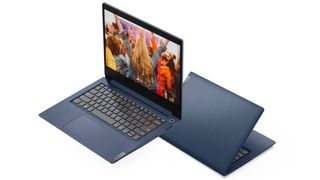
Lenovo IdeaPad 3
That said, the Lenovo IdeaPad 3 does have at least one clear advantage over the Acer Aspire 5 when it comes to ports and connectivity thanks to its integrated SD card reader. Obviously that connectivity can be easily added via a dongle. But it’s certainly one less thing to carry. WiFi 5 and Bluetooth are standard on both laptops.
Finally, there’s a fairly big gap in battery spec. The Acer Aspire 5 packs a hefty 49WHr battery, the Lenovo IdeaPad 3 just 35WHr. However, with two very different CPU architectures inside, it’s not just battery size that dictates battery life.
Acer Aspire 5 versus Lenovo IdeaPad 3: Specs and Performance
Easily the biggest difference, on paper, between the Acer Aspire 5 and Lenovo IdeaPad 3 is deep inside. The Acer Aspire 5 runs a quad-core Intel Core i5-10210U. The Lenovo packs an AMD Ryzen 5-3500U, again a quad-core model.
Both chips are two generations behind Intel and AMD’s respective cutting-edge CPU architectures. But in each case, you still get a proper quad-core CPU with plenty of performance. The Intel chip has the higher boost clock and generally delivers stronger single-core performance. Intel AMD CPU has the higher baseclock and will typically have an edge in multi-threaded workloads, such as video encoding.
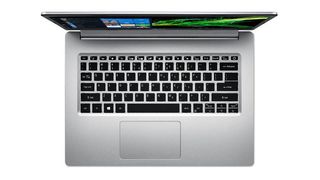
Acer Aspire 5
However, there’s not a huge gap overall both laptops offer good performance for most tasks. The exception is 3D performance and gaming, where AMD’s integrated GPU has the edge. It’s still not up to the task of running the latest games. But it offers the superior light gaming performance.
Elsewhere, it’s all very closely matched. At this price point both laptops give you 8GB of system memory and a decent M.2 256GB SSD. Those two feature points just so happen to hit our minimum required for a good, responsive day-to-day computing experience. However, we’ll give the edge to the Acer if you want to add additional storage. That USB-C port could come in handy with external hard drives.
As for battery life, much will depend on your usage patterns. Neither of these laptops have true all-day endurance, especially if you fire up demanding apps. But you should get at least six hours of real-world usability and more if you knock back the screen brightness and run light tasks.
Acer Aspire 5 versus Lenovo IdeaPad 3: Price and verdict
This is a very competitive part of the market and pricing can change fast. With the specifications discussed here, at time of writing, the Lenovo IdeaPad 3 undercuts the Acer Aspire 5 and comfortably at £479 to £549 – but check the widgets below to see the best prices in your territory right now.
On the other hand, the Acer has easily the better screen, which goes some way towards justifying the price premium. Meanwhile, Lenovo counters with that SD card reader and a more upmarket looking chassis.
In other words, at this accessible price point something inevitably has to give. No one laptop has it all. If screen quality is a major factor for you and you need USB-C connectivity, the Acer Aspire 5 is the easy choice. For everyone else, the Lenovo IdeaPad 3 is the more appealing laptop, but only by the very by the narrowest of margins.
-
 I tried Dua Lipa’s favourite perfume and it quickly became mine too – here’s why
I tried Dua Lipa’s favourite perfume and it quickly became mine too – here’s whyYves Saint Laurent Libre is my favourite date night fragrance
By Bethan Girdler-Maslen Published
-
 I used a foldable phone for a year – here are 5 things I learnt
I used a foldable phone for a year – here are 5 things I learntIf you're keen to join the foldable phone revolution, here are some things you should know
By Sam Cross Published
-
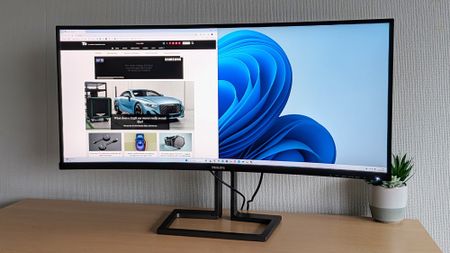 Philips 40B1U6903CH review: a 5k monitor ready to level up your productivity
Philips 40B1U6903CH review: a 5k monitor ready to level up your productivityIt's got the lot for a home office, but gamers won't be convinced
By David Nield Published
-
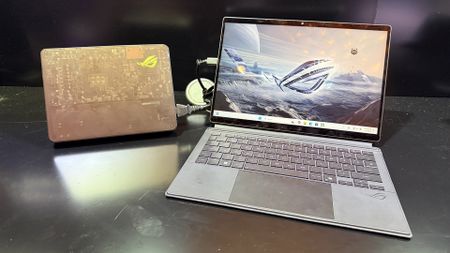 Forget your steam decks, Asus just updated its powerful gaming tablet
Forget your steam decks, Asus just updated its powerful gaming tabletThe Asus ROG Flow Z13 gets a big update for 2025, making it the ultimate gaming all-in-one
By Mat Gallagher Published
-
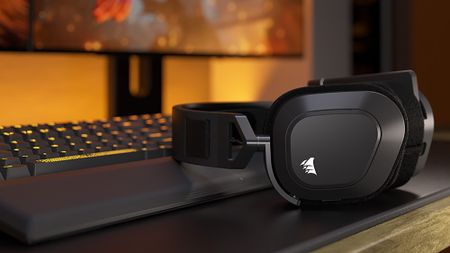 Corsair HS80 Max Wireless review: a solid mid-tier gaming headset
Corsair HS80 Max Wireless review: a solid mid-tier gaming headsetA capable audio option for the price you're paying
By David Nield Published
-
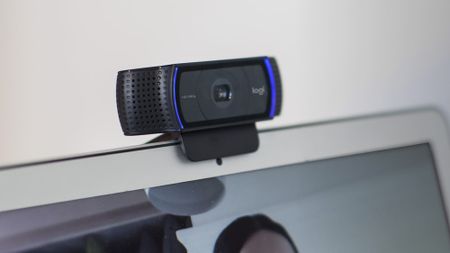 Logitech C920 Pro HD review: a solid and affordable webcam upgrade
Logitech C920 Pro HD review: a solid and affordable webcam upgradeThe Logitech C920 Pro HD has plenty to offer shoppers on a budget
By David Nield Published
-
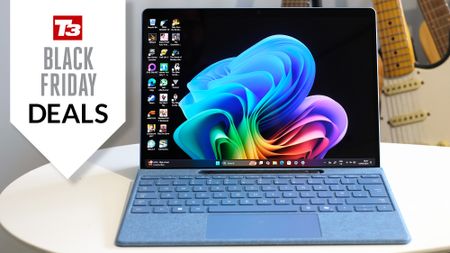 Microsoft's 5-star Surface with keyboard is Best Buy's killer deal
Microsoft's 5-star Surface with keyboard is Best Buy's killer dealBest buy it at Best Buy!
By David Nield Published
-
 Sonos' premium soundbar just hit its lowest-ever price in 5-star deal
Sonos' premium soundbar just hit its lowest-ever price in 5-star dealTop-tier sound doesn't have to cost top dollar
By David Nield Published
-
 Huge 75in Sony TV is now cheaper than ever in Amazon's Black Friday sale
Huge 75in Sony TV is now cheaper than ever in Amazon's Black Friday saleYou can now get a top-quality TV for less, with 100s of dollars off this set
By David Nield Published
-
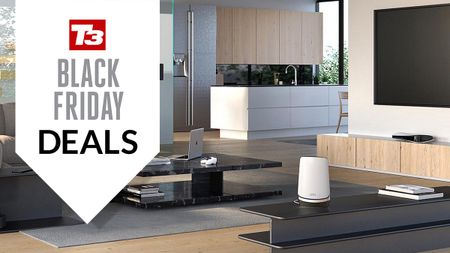 Improve your Wi-Fi with 5-star Netgear kit – now cheaper than ever
Improve your Wi-Fi with 5-star Netgear kit – now cheaper than everThis is one of the most powerful home Wi-Fi setups you can have – and it has hit a new low price on Amazon
By David Nield Published